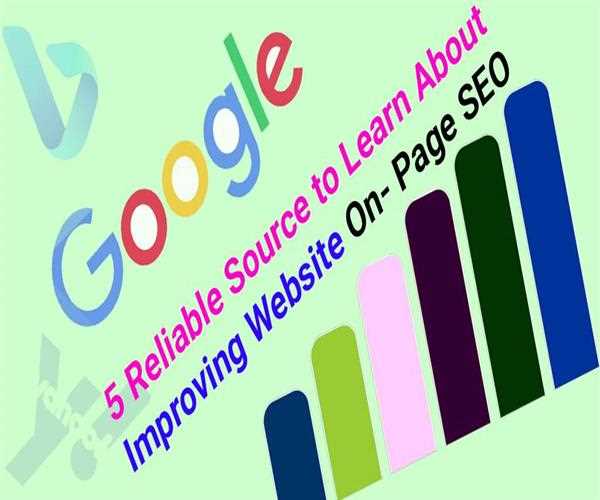
16-Sep-2021 , Updated on 9/16/2021 9:19:31 AM
5 Reliable Sources to Learn About Improving Websites On-Page SEO
If users are amazed at what you can do to make your site jump closer to the first page of results read on for a myriad of simple strategies you can employ to enhance your On-page SEO.
Primarily On-page optimization is one of the most key aspects of ranking a page for any given keyword. Also, you can break down communication barriers using On-page optimization tactics and immensely send stronger signals to search engines about what your page is about.
If users have been paying attention, general stuffing your content full of keywords isn’t exactly the good way to get your site noticed. Ideally, it could be argued that keyword density is somewhat outdated. It’s clear and true, the strategic placement of keywords contributes to major optimization, and there is no magic ratio that has been proven to lift your good ranking.
We learned that Search engines are processing an exclusive amount of data in their ranking algorithm. Moreover, Artificial Intelligence is becoming more aware of what users want and better at determining what content will assuage user intent. It is also conveyed that Google updates like BERT are indications of an increasingly more complex and savvy search engine. More importantly, On-page SEO isn’t just limited to keywords, but to the quality of content as well as its technical performance.
Know Everything about On-Page SEO
On-page SEO (on-site SEO) primarily refers to the practice of optimizing web pages to improve a website’s search engine rankings and earn organic traffic. Additionally to publishing relevant, high-quality content, on-page SEO comprises optimizing your headlines, HTML tags (title, Meta, and header), and images. They also indicate making sure your website has a high level of expertise, authoritativeness, and trustworthiness.
Important Ways to Improve Your On-Page SEO – GegoSoft SEO Services
Title Optimization
Comprise your keywords near the beginning of your title.
You must keep the length of the title under 60 characters.
Wrap your title in an H1 tag.
Utilize accurate, descriptive, and creative titles.
Optimize Your URL
You must use your keyword in the URL.
Offer users a sense of what your page is about by reading your URL.
Should Limit the URL to five words to maximize the potency of your keyword description.
Better to Limit the URL to 90 characters.
Utilize Descriptive Subtitles
You must Use subtitles to segment your content.
Should Use title tags (h2-h6) to signal the level of importance of each heading.
Develop scan-able content.
Comprise keywords and synonyms.
Develop Keyword Rich Content
You must use your keyword in the first paragraph.
Comprise keyword at least several times.
Should strictly avoid keyword stuffing.
Assuage the user’s intent (search intent) to make your page the last destination of their query.
About Image Optimization
You must use keyword-rich descriptions in the image alt tag.
Comprise your keyword in the file name.
Should fill out captions.
Utilize descriptive title.
Good to Incorporate Schema
Must implement schema to make your page eligible for rich snippets.
You should use a schema generator to better describe what your page is about with the proper code.
About Meta Description
Develop keyword-rich Meta descriptions.
You must entice the user to click on your page with accurate and creative descriptions.
Should limit your description to 160 characters.
Feature of Inbound & Outbound Links
Should use descriptive anchor text that links from internal pages and external sites.
You must avoid the overuse of keyword-optimized anchor text.
Must link out to pages that enhance the user’s understanding of a particular topic.
About Page Speed
Must keep page load time to less than 3 seconds.
Should keep your images compressed when saving.
Just reduce the number of HTML requests in your header.
Inline JavaScript (JS) and CSS.
Use plugins and CDN’s to maintain accepted load time.
Implement Proper Use of Redirections
Consider deleting or merging content use a 301 redirect.
You must avoid using 302 redirects and redirect chains.
Consider redirects should take a user from one URL directly to a new page.
Concentrate Repair Broken Links
Must identify and repair outbound broken links with routine audits.
Should use 301 redirects to repair inbound links.
Customize your 404 error page.
Get Accessible to Search Engines
See that your page can be accessed in less than 4 clicks from anywhere on the site.
Check your page is able to be indexed by search engines.
txt file allows content to be crawled.
Adopt Responsively & Made for Mobile
Get adequate size and space between buttons.
Simple to read text size and font.
Should limit paragraphs to 3 sentences.
Check the same functionality on different screen sizes.
Feature of High-Quality & Shareable
Offer unique value to compel users to share your content.
You must use images, video, audio, and interactive media.
Content is simple to read and understand.
Utilize Social sharing icons for easy sharing
Wrap Up
It is illustrated that On-page SEO is crucial because it helps search engines understand your website and its content, as well as identify whether it is relevant to a searcher’s query. Moreover, as search engines become more sophisticated, there is a high focus on relevance and semantics in search engine results pages -SERPs.

Employee
I am a Digital Marketing Executive at GegoSoft Technology. I have been working for 6 months. I know how to grow website traffic and ranking. I am doing social media marketing, Backlink work, and so on.
Join Our Newsletter
Subscribe to our newsletter to receive emails about new views posts, releases and updates.
Copyright 2010 - 2026 MindStick Software Pvt. Ltd. All Rights Reserved Privacy Policy | Terms & Conditions | Cookie Policy